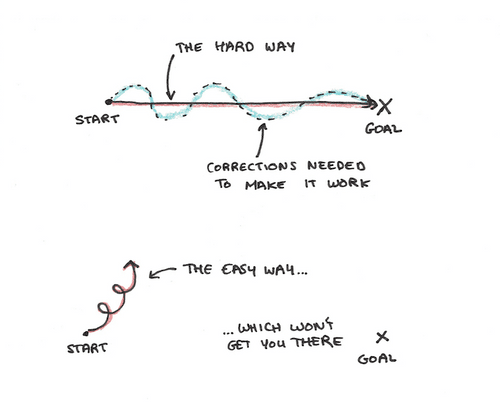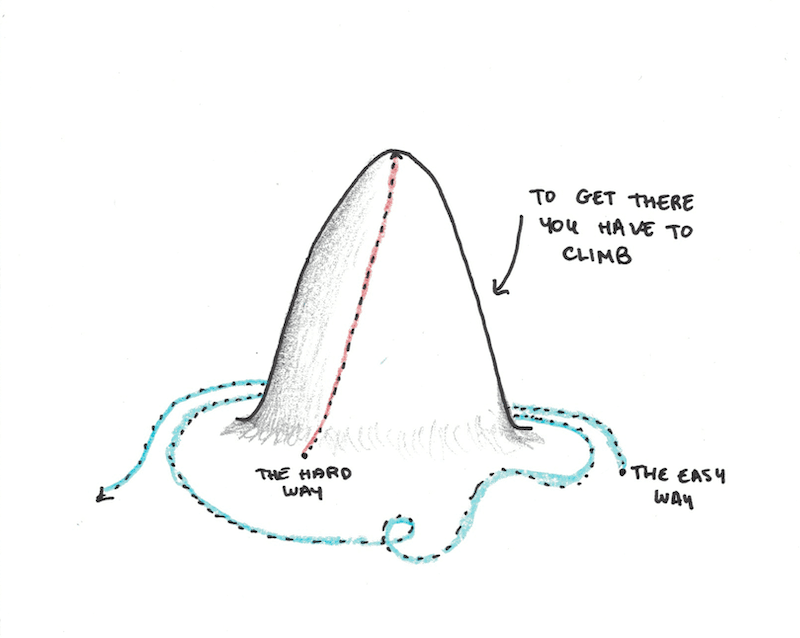Learn more about personaldevelopment with this collection
The role of coffee in social interactions
Different types of coffee and their preparation
The impact of coffee on society and economy
Doing the real, useful thing
Much of success boils down to doing the real thing and not an imitation of the real thing.
For example, if you want to learn a language: Start with full immersion. Speak from day one only in the language, except for work, friends, and family. The alternative is to download an app, listen to a podcast, and maybe you'll converse on occasion but may never communicate in the language at all.
To start, ask yourself how you would do this if doing it well was all that mattered.
349
891 reads
Lacking the time
Doing things well may seem daunting. You may feel that you don't have enough time.
But the point is not to deny your obstacles - it's to start with the best plan and make changes as needed, rather than simply starting with something that feels easy enough.
290
668 reads
The Paradox of Difficulty
The hardest things end up becoming the easiest, once you've fully committed to a pursuit.
When you've chosen to commit, make it a priority. Put it first in your calendar. Expect frustration and obstacles. You will get stronger.
379
898 reads
Committing to the hard way
Begin with what would work best. Hold the "but what about" for later.
Focus on what you have to do, not how much. "How much" will come later as the intensity can be scaled, but the real thing doesn't have substitutes.
309
621 reads
Make the hard possible
Starting with what would work, you now ask how you could make it possible.
Maybe you want to learn a language, but the real thing is out of reach because you're stuck at home. You want to work in a real firm, but they won't hire you.
Now is the time for substitutions. You can't travel, but you aim for immersion at home. You can't work in the real office, but you train on the tools they have.
276
437 reads
Make the hard way easy
Now is the time to make your efforts easier.
If you initially started with easy, you'll be tempted to do something convenient instead of something that works. However, once you know what needs to be done, make it easier to execute. Use systems and routines. Use every tactic to make it less difficult.
270
474 reads
Willing to put the effort in
The hard way forces you to ask if you are willing to put in the effort to do it.
Sometimes the answer is no. The cost is too high, or other obligations take priority. No is a valid answer. Better to say no now, and not let it eat away at your resolve. But if your answer is yes, you know how to do it.
273
479 reads
CURATED BY
More like this
4 ideas
How Important is Growth? | Scott H Young
scotthyoung.com
3 ideas
How to Commit to Long-Term Goals | Scott H Young
scotthyoung.com
8 ideas
The Hard, But Effective Way to Learn a New Language
scotthyoung.com
Read & Learn
20x Faster
without
deepstash
with
deepstash
with
deepstash
Access to 200,000+ ideas
—
Access to the mobile app
—
Unlimited idea saving & library
—
—
Unlimited history
—
—
Unlimited listening to ideas
—
—
Downloading & offline access
—
—
Personalized recommendations
—
—
Supercharge your mind with one idea per day
Enter your email and spend 1 minute every day to learn something new.
I agree to receive email updates

